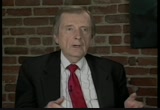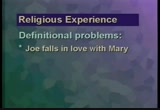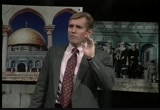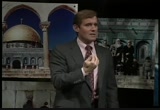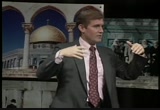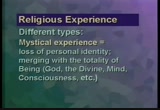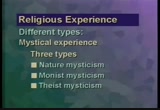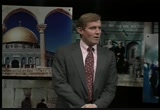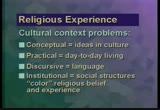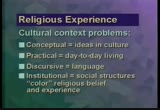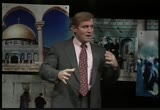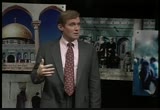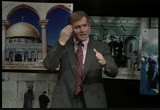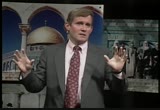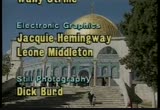tv Mosaic World News LINKTV September 13, 2012 7:30pm-8:00pm PDT
7:30 pm
near-death experiences - when do they happen? what type of people have them? what are the neurological and psychological mechanisms? these are all scientific questions. now, what do they mean? those are the philosophical and religious questions. >> you see, that's so interesting about meeting with him is he's saying - like we are saying in this class - religion happens, apparently, paranormal things happen; now how are you going to study about them? obviously, the religious person wants to find meaning out of it, and that's part of what we're talking about it, but you can go out scientifically and measure things. we'll get back to this in terms of jz knight who channels ramtha, we'll talk more about this. but he went up to her ranch near seattle, washington, and hooked her up to all that fancy electronic stuff, and said, "okay, let this 35,000-year-old master into your body. and she ascended to do that, and he, as a scientist, accompanied by a psychologist,
7:31 pm
a psychoanalyst could not explain how the charts - it went way off the charts. a couple of them, you could fake; the rest of them, you could not fake. and so that's the kind of thing he does is to go out and measure it. so the reason why i wanted to listen to dr. krippner is to say we all come to this from various backgrounds, and to some of us, it's, "oh, that's so silly, this doesn't matter"; to others, it's, "yes, yes! near-death experiences-wild! let's levitate! let's do that." but we could take a middle road in this class where we simply say, "they happen. let's talk about it and let's see how religious experience touches all of us." and so that's what i wanted to set up, if we could go into the notes now, and look more formally at religious experience. it gives us a groundwork to see just how interesting but difficult a subject area this really is. first off, you notice that there are difficulties in determining what it is. for instance,
7:32 pm
i'd love to just start out here and ask if anyone's had one, but you know, we might get around that before the end of the semester, or maybe some bold folk would want to do it. but let's think about what people say when they say they had a religious experience. first off, a lot of times, it's about love. we all know that feeling - joe falls in love with mary and, "oh, i'm having a religious experience." infatuation - probably most of us in the room have felt that wonderful special feeling of infatuation when everything is right. you know, you fall in love, those first weeks, everything looks beautiful. you stop and smell the roses, and it's wonderful. i wish it would happen to me someday. but you know the feeling, it's great, you know. and three weeks later, you find out the person's a person; what are you going to do? but that initial feeling has often been described in terms that are religious, and then we're back to this business of love, and how special but how diverse a term it is. so sometimes people use it to
7:33 pm
mean things that don't really account for the transcendent but are very meaningful. the one that i love is the second one here. oscar trudges up mount shasta, which is this beautiful mystical mountain out in california, and experiences a profound thing perhaps like janet out in the silent forest - something overwhelming happens. and it comes in so many different flavors and forms. it could be a sense of the eternally perfect oneness of being, that everything always has been perfect, everything always will be perfect. it could be the experience of the presence of god, even if you can't use the term god. but something overwhelming happens, and a gallup poll tells us that at least 40 percent of americans have had some kind of experience like that. another one here is sally has a near-death experience. what happens in this case? she's crossing route 30 to get a hamburger at wendy's or something like that and gets hit and is down
7:34 pm
there and the paramedics come and they bring her back to life, and she has this - and she speaks about going through the tunnel, seeing light at the need, turning around and coming back. i mean, the studies that krippner has done in near-death experience show extraordinary parallels - and maybe some of you have read about that - that people have found a similar thing and for whatever reason have come back to this side and usually when they do, their fear of mortality is definitely diminished. so we have that element there too. types - now let's look at some types here for a moment of religious experience. and by difficulties, we mean we want to try to sort out what we're talking about when we're speaking about it. it makes it more interesting and more helpful. so when we speak about types, we're speaking about different kinds of religious experience. and we have up here on the notes the numinous experience,
7:35 pm
and rudolph otto, in his initial study of religious experience found the numinous to be this all-inspiring, overwhelming feeling, like moses and the burning bush - that biblical story where your identity remains the same. you're here, but you encounter something other - there's an other here - and it is both terrifying - he had this audio - it's terrifying, but it's fascinating, it makes you tremble - and that sort of a situation. and we've read about these all the time. we walk outside of governor's state, and on that piece of junk - i mean, that beautiful sculpture out there as you go out the thing, there's a 200-foot apparition of mother mary appears, and everybody runs out of the building and goes, "whoa! what are we going to do?" and you read about those around the country, that people see these things on office buildings and - that's what we mean by the numinous; it's something that makes you go, "whoa!?"
7:36 pm
but you're attracted to it. i think that we have, particularly in islam, judaism, and christianity, we're very open to that kind of a religious experience. but the one i think that is more common, outside of an identifiable religious organization, though not entirely, is the mystical experience. and that's another fascinating one that we want to look at. in fact, our next class, we want to look at meditation and mysticism. but mysticism is a different from the numinous, because that sense of separateness fades away, and you become one... you are going to hear this over and over again - unity, oneness. we have different types here, and let me run these through, because we'll come back when we look at mysticism itself and we'll see there's different kinds. like oscar going up mount shasta, you feel one with nature you're one with it. your self is gone,
7:37 pm
and we'll have enough time to ask any bold folk that want to put this forward, but i think i've felt that at some point in my life out in nature. you're lying on the beach, the ocean is coming in, it's going out. it's almost a cliché, but all of a sudden, your separate sense of self, all of that fades away and you are one. and we'll talk about native american spirituality, and we'll have a representative of native american spirituality come down here and we'll see, in those kinds of traditions, that oneness of the universe, oneness of the cosmos. a baby is born and you honor the cosmos and give the baby to the cosmos is part of the native american tradition - we want to look at nature mysticism there. monist mysticism is a variety. here we're looking at buddhism and hinduism. here, you're one with the mind of the universe, through meditation - very common in buddhism
7:38 pm
and hinduism. and we'll talk to a hindu swami, who will speak very articulately about how his meditation brings him to a oneness with the consciousness that is the mind of brahman, or god, in the hindu pontience [sp], so we'll look at that. and it doesn't mean that christianity or judaism or islam is left out of the mystical picture because we have the theist tradition - popular in eastern orthodox christianity, and we'll talk to folks in that area, but one - well, here's an icon. if you can see this icon here from the eastern orthodox church in caana, where jesus turned water into wine. a deeply devout eastern orthodox person would not just see a picture of one of the ancient saints or martyrs - that's a window into heaven; that's a window up through theosis that draws the believer into an identity and relationship where that line between identity
7:39 pm
and relationship is erased and they are one in that spirituality. and we'll find that in christian mysticism. we'll talk to a woman who is a christian mystic and also practices these. so interesting stuff, and that's why i've just devoted a whole second class to it. let's just get the notes out the way and then we can come back and talk about perhaps some of our own experience in this area. another interest facet is, well, how do we describe religious experience or mystical experience? the word ineffable comes to mind you cannot speak of to it. well, part of it comes back to our little roll-in on the holy - we have to have things, so we speak of flowers and rivers and how the river runs into the ocean. but there is some difficulties as we try to determine what people are talking about, because there are different cultural context that shade or color. i like to think of it as a prism, and we even have a graphic on this that finishes up
7:40 pm
this set. but let's put it up from up front first - cultural is like a prism - cut in a certain way, and might we say the pure light of religious experience shines through these various cultural contexts that we're going to see, and out the other side comes a variegated rainbow of different shapes and sizes and colors that are dependent on some of these cultural characteristics. yeah, janet? >> so people looking at the same thing from different points of view from different cultures get different stories, for example, people from the west look up in the sky and the see the constellation they call orion - three stars in a row. then the aborigines of australia look up and they see three guys going fishing. >> exactly - that's exactly the theme that we're talking about here, is what do we have - if we could sit down - maybe we'll do this after class, go down to the local pub or something. but to sit down and talk about our religious experiences, how could i make sense of it?
7:41 pm
i've had a few profound ones. in fact, i would say that i probably had a nature mystical experience, a monus mystical experience, and a theis mystical experience. but when i try to think about how could i sit down and honestly use language, it's very, very difficult. you kind of go, "hmm, that's interesting." and then we're back to that interesting word that means, "you need help," how we use interesting. but that's the idea, so it's difficult, and that's why when we listen to someone speak about religious experience, coming from different traditions or maybe not a tradition at all, we have to make sure that we're aware if we want to generally try to understand what is their cultural context. and you know, if you're on the graphics, we just list some obvious ones - concepts in a culture; different concepts will shade - we talked about - one woman was here in the other class who talked about androcentric language in the bible. if the concepts are such that god is a man,
7:42 pm
then who are you going to meet at the light at the end of the tunnel? are you going to meet bob or dan or jim? you're less likely to meet sally or mary or what have you. so concepts shade our religious experience, because what else do people have to go on? the practical aspect - if you're in the desert here, you're going to hear discussions what it's like when the sand blows in the sounds of time. you're not going to hear it's like how the waterfall trickles down through the pine trees, or how when the great white bear floats by on the ice, you better get the hell out of there - that kind of thing, where people are using the practical things in their own cultures in order to make sense of their - and that's where we're getting back to the acre piece, drawing from the symbols. discursive is simply meaning language. there are some languages that have no word for hate and no word for evil. like we're stuck as - love has come up
7:43 pm
a couple of times in the past two classes - we're stuck with a four-letter word here, to describe something that is so extraordinary and so magic and powerful, when perhaps a greek would have maybe six different ways of saying that. so language, limits us itself. and then last, of course, is the big one, which we've already touched on quite a bit in this class, which is the institutional. obviously, if you're in the belief style - and this actually leads us up into the next two graphics, so let me just roll those up and i'll just give you a good example as we go through the next two graphics that illustrate the belief stuff. description - what are people saying? it's the difference between you're trying to describe something that is so extraordinary - as a nature experience or a numinous experience, you're trying to use language to describe it, but there's a clear difference between description and interpretation,
7:44 pm
and that's the gap there, where we're always going to find people using that prism of their own culture to describe something that - the big question. is all spiritual, religious, mystical experience the same, and it's just talked about in different ways, or is it cultured based. and there's been enough academic ink spilled on that one to float a boat. so it's a challenging question. but that's one of the ideas - if a person - now let's say sally has had her near-death experience, and she has a background as a born-again christian. and so we say, "sally, what happened?" and she says, "i went through this gorgeous tunnel and i heard the singing of angels, and at the end of the tunnel was lord jesus and he held out his arms and said, "time for you to go back, sally, there's more to do." so her language is very reified - it's very colored by her religious background.
7:45 pm
so we get very specific kinds of interpretations on what happened there. now let's say sally is - >> an agnostic. >> yeah, an agnostic. good, chris. she's an agnostic. well, then we're going to have less defined terms. and might we say that perhaps her description is a little bit clearer. just like, "i don't know" is a good question there. is she being colored a little bit less by her cultural background or her institutional background? she might say something like - she might describe it in more neutral terms - "i went through a tunnel and heard beautiful singing, and there was a light; it looked like a figure at the end. and i couldn't really make out what it was, but it glowed and i felt love and warmth, but it felt that it wasn't my time." so we get more neutral terminology. yeah, jamie? >> then what do you say to people, young seekers especially, who want to ask you about the parting of the red sea? jesus turning the water into wine? moses encountering god
7:46 pm
in the burning bush. what do you say to young seekers who pose these questions or how to think about this? >> i would say just that, that we have to understand these phrases in the cultural context of the time - that these people are using metaphors and images that have power, and it makes sense to them. i say this over and over again - in fact, you've really hit on a strong point here, jamie, because i've thought a lot about the book of revelation and the fact that we're coming to - we're around the time of the millennium, and every person is taking that text and applying it to current situations in our own time. but first off, that's everybody's right in front society to apply it to situations in their own time. but let's first off understand it in its cultural context, and when you do that, you realize that you have john of patmos who is speaking in an apocalyptic tradition, in a time of terrible turmoil for the early christian community, pressured by the romans. he's using a symbolic language
7:47 pm
that probably nobody really understands today - that was part of something that was in his own group, and so let's start there. then you could begin to make judgments about where you want to go. so i think what you're bringing up is a key part of this. when we're speaking about miraculous events coming out of a very ancient time, let's know the cultural context. let's not say, "that can't be true!" but let's say how do we understand this best we can by going back and understanding the mind of somebody who would write about the parting of the red sea. now let's think about when that's written - it's written when the jews are in exile in babylon; that's when they begin to write the tora. and then we've had years upon years upon years of time to allow this to be interpreted. and what did that metaphor mean - the parting of the red sea? well, it meant power and meant dominion and meant freedom. did the sea really part? i don't know. but to them, that metaphor meant something, and that religious or numinous experience occurred within that context.
7:48 pm
so that's a good point. yeah, warren? >> i wonder if, following this argument, if an atheist had a near-death experience, if they would come back and say, "i got to the end of the tunnel and there was nothing there." >> yeah. i was waiting for you to get one of your zingers in. but if an atheist had a near-death experience - i mean, that's an interesting point - what kind of language or description would the atheist use to make sense of that coming back? if the atheist came back, i mean, it would be a wonderful story. "what exactly did you see?" "well, i saw nothing." and that, in its own way, is exactly what the atheist had to see - the atheist saw the big nothing. yeah, chris? >> i think chung tse says it best. he was an ancient chinese philosopher. >> i think i knew him. >> well, i know you would but - sorry. do you channel him?
7:49 pm
that which can be said, "that which can be communicated "cannot be the truth. "yet that which "cannot be spoken, "that which cannot "be communicated, that is the truth." and to me, that's like - that's still kind of the whole point of what we're doing. it's like maybe we - if there is this thing as a higher power, maybe we as humans can never communicate the sheer, like awesomeness of that. and maybe that's where we encounter trouble. >> and i agree with you so much, because how could we. i mean, what if we figured it all out? then what do we do, sit around and watch tv? it's like there's no aspect of it. if this process we're in - identity and relationship - is alive, is growing, is effervescent, then what is this lust to suddenly know it all, so you can put it
7:50 pm
on the mantelpiece and say, "i got it; i don't have to worry about it." but once you've got it, then what are you going to do? where are you going to go? and so i think that's what they're talking about. we're never going to get to the full explanation of - silence oftentimes is the only explanation. i remember a great line from houston smith, the great religious scholar who spoke also about that. finally, you just have to be quiet and listen. at the same time, we're symbol creators, we're talkative, we're inquisitive, we're in relationship. so we've got to keep talking; that's part of it. yeah, helen! >> we've got to use words when we talk. i've got to use words when i talk to you, and i've got to use words when i talk to you. but, there's a saying, the finger pointing to the moon is not the moon. so we should recognize when we're talking to each other, that we're only fingers pointing. and you know how important that statement is and perspective is in a class like this, because we are talking about religion and we're starting out talking about religious experience. but let's never lose sight of
7:51 pm
that-we're not experiencing it, that's something that goes beyond the walls or the curtains or the pictures of this classroom, where you're called upon in your own life, in your own way, in your own consciousness to make sense of your life. we are talking about it and we're using words and we're using a language called english, for the most part. but there's something beyond that, and that's where we are. that's why i wanted to bring up this segment on religious experience, because as we move through and we discuss myth - and actually, jamie brought up a wonderful point - parting of the red sea - when we talk about myth, we're going to talk about very fantastic and symbolic kinds of things. and so let's be sure when we're listening, we're trying to listen with some element of cultural context, in order to make sense of it as we move through it. suzanne. >> i was just trying to tie the other few things that's been going into my mind. >> i hope so. for all of us. >> well, it's like - the english language is what we're using. and it is a limit.
7:52 pm
we've got one word for love; we've got a whole lot for hate - despite, abhor, dislike, revile, i mean, you can go on and on all day about how you feel - negative feelings - but our language does not - it has a preciosity of things to talk about the other. but then also, in terms of sign shifters, it brings me back to kate cogan, and what did she see? what was the original thing? i don't know the teachings of wicca that she followed up on her original draw, but it was the fact of her womanhood, her female person being celebrated that drew her to that. and that is a shift in paradigm that could - easily, difficultly, whatever - maybe will in the next millennium - in this year 2000-plus, happen, because even with
7:53 pm
language and words, there are studies that go on about the language christ spoke aramaic wasn't so limited. the word he probably used in aramaic that we translate father, because of our judao heritage, could just as easily be translated as mother, or source, or parent or a whole lot of things. but it would be very offensive to an awful lot of people to use one of those other terms, because we're so used to our father. >> the world of language and the world of religion intertwines to such an extent there's a whole field of religious studies about language. when you use language, you are interpreting - it is inevitable. and we think in a language. for those of you who've become - when you're fluent and you go beyond fluent, what it means when you think, to think in another language, you've learned it well enough that you think in it? have you noticed that you see a different world, a slightly different world when you begin to think in that other language?
7:54 pm
and language - part of the elements we talked about, about the cultural context, is you could use all kinds of different analogies. you could put on different colored glasses and see the world in a different way. you could have a different computer program running through your mind. aldous huxley talked about the doors of perception, and how either - i certainly would never do this because i'm a clean-cut person - but some people took drugs back in the old days, and things that change your brain patterns and you see a different level of reality. all these are elements that - to come back again and speak about some of our key class themes - when we're speaking about religion and religious activity and religious impulse, we are talking about something that's extraordinary. and then language is behind it, trying to catch up. >> people who study languages, or even just study one other one, they'll say, "oh, well, the french have a word for it."
7:55 pm
or "the germans have a word for it." or somebody else - "the amish have a word for it." >> and then they say that they can't translate it, >> because we have no word for it. >> because you have no eyes to see it. and that's the key we've got to get back with religious experience when we're hearing it, and when people - believers - talk about it. that's why i wanted to bring it up fairly early on in the course, because they're seeing something else. >> but then here's the thing, when you get so many of the clergy people, of both sexes, will make their presentation in their sermon or whatever, particularly on those occasions, it's like they know, and like this is how it is. and that's across faiths - i think there's no one faith that has a lock on that - >> yeah, you're exactly right. >> paired up with, don't seek, because you've already got it right here. >> and all i would like to offer up in terms of religion, because we are religious studies
7:56 pm
and we're not proselytizing here or speaking about a specific religion is does it not then make sense as you in your own individual lives are always slightly changing, slightly adjusting that business between you and the other. life forces us to constantly make adjustments. and so we begin to make sense that one's spirituality, either within a specific religious organization or outside it as a seeker or somewhere in between, also constantly has to make those adjustments, because life is never going to be that wonderful set of answers that you put in a box and put on a shelf. but that cuts against the grain, and we will meet fundamentalists of various ilks in here who will have none of that. and so how do we explain them? >> well, not that god's a woman either. you're like this enormous thing that's beyond - surpasses all understanding,
7:57 pm
transcends both of these. >> and there has to be a transcendent. i mean, many people would love to get the set of answers. and once this class is over, i'm going to write a book that's going to be called, "the set of answers," and i'll sell lots of copies and get really rich. sure, go ahead. >> i think we should be quite wary about this out-of-body or transcendental feelings. it may be fine of the person, but because of the great diversity, which you talked about, and where the person is coming from, where are they coming from - we may not know where they're coming from, but we may be too apt to glean onto their ideas. i think you have to put some of this into proper perspective, and i think you use the right word about proselytizing. i mean, it might be fine for them, and we may want to listen, but don't push me. >> and that's a great point. believe it or not, whether we like silence or we don't like silence, there's only 20 seconds more
7:58 pm
to go in the class. but let me pick up that point - we do have to be conscious about that, and that's what we want to do with those kinds of things. janet, can you do 10 seconds? >> constantly making those adjustments - i would just like to ask if everyone here has sat perfectly still without making any adjustments for the last hour. i would bet you haven't, and so it's our human nature to make those little adjustm. >> it certainly is, and in the next class - da da, perfect timing - we're going to be talking more about meditation and mysticism and keeping all this. so think about some of these thingsnd bring in some of those things to share. see you then.
157 Views
Uploaded by TV Archive on

 Live Music Archive
Live Music Archive Librivox Free Audio
Librivox Free Audio Metropolitan Museum
Metropolitan Museum Cleveland Museum of Art
Cleveland Museum of Art Internet Arcade
Internet Arcade Console Living Room
Console Living Room Books to Borrow
Books to Borrow Open Library
Open Library TV News
TV News Understanding 9/11
Understanding 9/11